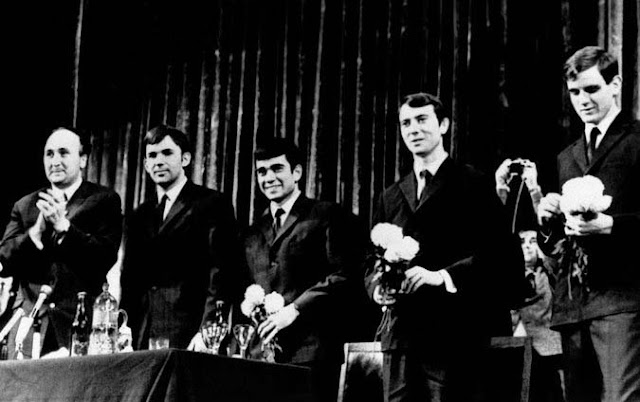Fifty years ago, civil discourse was breaking down over the expanding Vietnam War, and the gulf of disunity that was widening in American society was beginning to surface in its military. Some civilians selected to serve in the US Army began burning their draft cards while others fled the country before their numbers came up. Some in the active duty ranks even began abandoning their posts, and the Navy was no exception.
In late November 1967, the American public learned of one of the more dramatic examples of a wartime military fraying at its edges, courtesy of a Japanese "peace committee" and some Russian intelligence operatives. Four young enlisted men who had disappeared from the Norfolk-based aircraft carrier USS Intrepid (CVS-11) during a port visit to Yokosuka, Japan, in October appeared on a Soviet television show in Moscow to denounce the American war effort.
Before throngs of adoring students shouting "molodets!" or "well done!" at Moscow University on November 22, 1967, Airmen Craig W. Anderson, Richard D. Bailey, John M. Barilla, and Michael A. Lindner were awarded the Lenin Peace Prize as they repeated the same message they had first told a Japanese peace group called Beheiren ("Japan Friends of Vietnam Committee") during a filmed interview some weeks before. Twenty year-old Airman Craig W. Anderson had said, "You are looking at four deserters, four patriotic deserters from the United States Armed Forces. Throughout history, the term 'deserter' has applied to cowards, traitors, and misfits. We are not concerned with categories or labels. We have reached the point where we must stand up for what we believe to be the truth." In the same filmed interview released by the Japanese, Airman Richard Bailey, the 19-year-old son of a lieutenant commander in the Naval Reserve, said that the American public had "reached a point where they are finished demonstrating and are going to take an active hand in stopping the war machine."
"It became clear to me that we were killing people"
The day before the event at Moscow University, the Communist Party newspaper Pravda, or "Truth" carried a long interview with the men, who repeatedly used the term "mass slaughter" to describe what their government was carrying out in Vietnam. "It became clear to me that we were killing people," said Airman Barilla, who had been a member of Intrepid's catapult crew before his desertion. "I am convinced that the United States does not have any right to be in Vietnam." Bailey chimed in, "I never gave much thought to the war until I reached the coast off Vietnam in mid-1966. Actually my work aboard the carrier was very easy. At first I did not give much thought to what I was doing. It was only this past year that I began to understand I was taking part in a dirty, unjust war."
Statistically, the desertion of four junior personnel from an aircraft carrier that carried a compliment in excess of 3,000 was not significant, but their appearances in the Soviet news media greatly magnified their stature, if only to embolden the antiwar movement and tweak the noses of those in the American government.
As the four were being feted as heroes in Moscow, reporters began to focus in on the new Soviet celebrities and what their motivations might have been for defecting.
"It is not possible to list precisely the moods, emotions and motivations that led to what is now officially desertion," wrote New York Times writer Barnard Collier in December 1967. "What does emerge from a series of interviews, however, is a profile of four young men without personal goals, who had menial jobs aboard the Intrepid, and who brooded about the sameness and loneliness of their shipboard routine."
None of the men had been standouts in high school, good or bad. Bailey in particular had been on probation for breaking and entering before his enlistment, but Collier singled out Airman Anderson as having had significant problems with the military even before his active duty service began. He had become a member of the Navy Reserve in 1965, but had been activated due to his missing too many drill sessions. When he finally reported for duty, he reportedly had shown up in civilian clothes and "long and shaggy" hair. He was sent home, where his mother, Irene Anderson Hill, attempted to talk some sense into him. Before leaving, he told his mother, "I just can't take authority or discipline."
Even the secretary-general of Beheiren, the group that made their escape from Japan possible, was hard-pressed to paint the men as principled, much less heroic. "The four American boys are not revolutionary fighters, and they are not backed by ideologies," Yuichi Yoshikawa said in a statement to the news media. "Nor are they go-getters determined to devote their whole lives to politics."
"Ratline Japan"
The four Navy deserters were among 400 or so American servicemen who disappeared from Japan in 1967 alone. Army intelligence documents declassified in the 1990s detailed that the Japanese "peace committees" that spirited away the deserters were working as part of a sophisticated KGB-run network called "Ratline Japan," although the Soviets did not officially control or finance the committees. Military intelligence agents had focused upon the Beheiren group, which distributed leaflets to servicemen featuring a telephone number. American military personnel who called the number were contacted, assessed, and vetted before they were smuggled to Nemuro, a seaport on the northern island of Hokkaido. From there they would be transferred to the Soviets for exfiltration.
The journey of the men who came to be known as the "Intrepid Four" had begun while they were on liberty outside Yokosuka Naval Base, when they destroyed their uniforms and ID cards and traveled to Tokyo, eventually making contact with Beheiren activists. After staying in a series of safe houses, with the help of an American antiwar activist clad in orange saffron robes that was described by one Army agent as "Marxist-Zeninist," the four were taken to Yokohama, put on the Soviet freighter Baikal, and taken to the Siberian port of Nahodka on November 11, 1967.
Undercover agents with the Naval Investigative Service (now known as the Naval Criminal Investigative Service) succeeded in shutting down the ratline in November 1968 by mounting a "dangle" operation, in which a notional, or fake, deserter accompanied a real deserter and his Beheiren escorts until they were apprehended in Kushiro, Hokkaido.
"Fed Up with Russia"
The halcyon days of the so-called Intrepid Four lasted for about six weeks, but the warm glow of Soviet adulation was fleeting. After a few weeks in Moscow, the four deserters were, according to a diplomat who encountered them in Gorky Park, "fed up with Russia." They also admitted that "the Russians are fed up with us, too, and don't know what to do with us."
The four eventually made their way to Sweden and dropped out of sight, but one of the defectors, Craig Anderson, surfaced again last year, ostensibly to promote a memoir and "rally a new generation of Americans to take a more vocal stand against the nation's current military campaigns." But his retelling of his life after taking his own stand; or rather, after he turned and ran, did not make for inspiring reading.
Three years after reaching Sweden, a haven for American deserters and draft dodgers, Anderson made his way back to his home in San Jose, California, where he discovered that has mother had become an alcoholic and his brother refused to speak to him. Not long after that, he was apprehended in San Francisco and spent nine months in a high-security brig on Naval Station Treasure Island, where he went on hunger strike and was transferred to a hospital for psychiatric assessment. According to Anderson, prosecutors had sought to give him a four-year sentence for desertion, but he was able to walk away with only a bad conduct discharge.
During what was described as "decades-long journey in search of himself," Anderson lived in a tent in Mendocino County, then later relocated in Mexico, where he wrote novels under a pen name. After divorcing his second wife, he relocated to Southern Nevada to be closer to a woman he met on a political chat room, and it was there where he composed his memoir. During that time, he reached out to the other three who had defected with him over four decades earlier. Two had stayed in Sweden, while another, John Barilla, had settled in Canada.
Barilla remarked to New York Times reporter John M. Glionna that, after they had made contact, he and Anderson had relived "our magical mystery tour."
The Beatles' celebrated parody of the Beach Boys and Chuck Berry, "Back in the USSR," was released exactly one year after the "Intrepid Four" appeared on Soviet television, but it remains pure speculation as to whether the "Fab Four" might have been inspired by those four other young men who, by the way, would definitely not be back to the USSR.


No comments:
Post a Comment